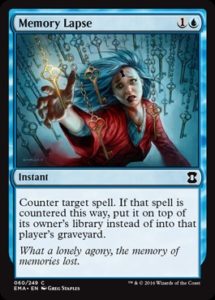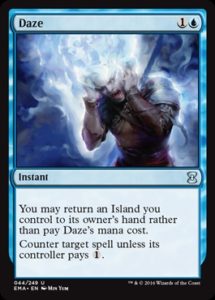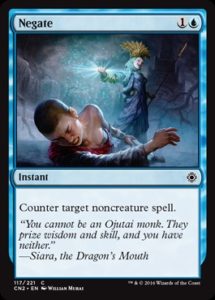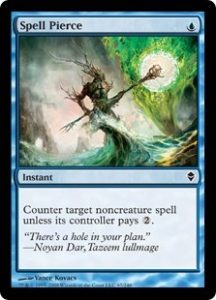Top 16 Blue Cube Counterspells – Part 2 of 4

This week we continue our countdown of the top 16 blue counter spells in cube. Starting with number 11….

This is a beastly little proactive counterspell come disruption spell. Part Chittering Rat and part Remand, the Memory Lapse is an unusual card that finds different uses and homes than the other counterspells. Like all good counterspells Memory Lapse goes one for one with a card and stops a thing happening. Like some of the best counterspells it can stop any counterable spell it chooses for the bargain price of two mana. Placing the card back on top of the library is somewhat of a mixed blessing although intended as a drawback compared to actual Counterspell. Most of the time you want the thing you are countering gone and so them just getting to cast it again next turn is rather tedious. If however the spell you manage to place back on top is one that is only useful because of the stage of the game such as a ramp spell then you have gained a huge advantage, greater that you would have gotten from putting that card in the graveyard. A turn two ramp spell is powerful because of what you can do with four mana on turn three however a ramp spell does very little unless you are accelerating into something else. Not only will you have disrupted their turn three power play but you will have decreased their card quality by replacing a draw with an out of curve card that is not of much use. The optimal targets for Memory Lapse are low powered card that have situational high value at certain timings within the game. This can also be applied to high powered cards that are trying to be resolved in a high mana window, say a card played from the mana boost gained via a Dark Ritual, a Mana Vault or a Channel. Obviously they will not have sufficient mana in their next turn to just recast the spell in question and so they will have a dead draw coming their way. Memory Lapse is also pretty much a hard counter when used to force something through and/or when you can win the game in that turn as a result, a little like Pact of Negation. The main thing holding Memory Lapse back within this rating is that it is rather a win more card. When you opponent is a bit behind, either they are struggling for lands and need to draw them or they are a little flooded and are only able to cast low curve spells of little consequence then Memory Lapse will really punish them and act a little like a Time Walk. When you are behind however it is not doing that much to bail you out of the situation. With all this taken into account I much prefer to play Memory Lapse in the proactive decks than can apply pressure and get on the front foot. I also like to try and maximise the negative effects it will have on my opponents by appropriately pairing it with disruption effects such as Wastelands so as to increase my odds of them having mana difficulties. If your deck is predominantly responsive then Memory Lapse will under perform for you but is still viable just as an early tool capable or drawing out the game. If you have a lot of card advantage effects then it is a powerful tool in an attrition resource war.

Pesky and cheeky are the words that spring to mind when thinking about Daze. It is a beautifully designed card that is impressively diverse in use and leads to a lot of complex decision making for both you and your opponent whilst remaining simple, elegant and remarkably fair. It ticks a few boxes immediately in that it is a spell with different casting options as well as a zero mana spell should you chose it to be. Free countermagic demands close attention and unlike most other free countermagic Daze has no associated card disadvantage. Sometimes returning an island will be far more painful than throwing away some cards from hand and sometimes it will be irrelevant. The scaling of this effect is the opposite to it’s scaling of raw countering power, part of the elegance of the design. As returning a land becomes less detrimental a Force Spike becomes less effective. It is hard to know how important it is to keep your land count up compared to the spell you are considering countering. The fact that Daze can become completely dead in the late game or even when your opponent has a good read on you puts pressure on you to use it early. Whenever you do get to Daze something you feel like you have done well out of the exchange but this is more a reflection of the low nominal power of its effect and not because you inherently gain value from casting it like you do with a Cryptic Command. The real strength of Daze lies in how difficult and damaging it is to play around, in essence it is at its best when your opponent knows you have one but you don’t have it in hand. Compared to Force Spike it is harder to read if they have a Daze in hand or not, they never need to leave mana open to be able to cast it and are able to tap out with impunity. It is easy to play around Force Spike or Daze but does really hurt your early game tempo to do so. If they are representing the Force Spike then generally playing around it is OK as they are not spending all their mana or curing out optimally either. If you try to play around a Daze in the early game in the same way you will just find yourself getting really behind. Mostly I think it is correct to just ignore Daze and walk into it hoping your opponent will overeagerly ruin their early tempo in a bad use of the card! As with most of the early game non-hard counterspells in the cube, Daze is improved when you have decent filter and card quality effects as well. It is at is best in tempo decks wanting to pose questions but still have some answers up their sleeve but is still very strong in control decks . It does need much more care to be used in a beneficial way when you are the control player because your land count is so much more relevant. In control the best application for Daze is to add security to making a mid game permanent such as a planeswalker, earlier use, unless hard cast, is too damaging to your tempo.

This simple little card has greatly risen in my estimations over the past couple of years. It is cheap and reliably does what you predominantly want counter magic to do. Every colour has the capacity to deal with creatures albeit with varying effectiveness. Very few colours have the ability to prevent spells from resolving. Black can pluck them from you hand, white can make casting spells awkward while the best red or green can do to curtail casting is to attack the mana base. The variance in ability between the colours to deal with creatures is negligible when compared to the variance across the colours in their capacity to combat spell casting. It is one of the reasons blue stands out as the most powerful colour in Magic. It is nice that a lot of counterspells can deal with creatures however it is not the reason you are playing them, nor is it really efficient or even viable to attempt to control creature strategies with countermagic alone. A good control list will have dedicated parts of the deck tailored to efficiently deal with creatures thus allowing you to reserve your counterspells for things that you need them against such as Armageddon, planeswalkers, Mind Twist and so forth. When you are playing counter magic specifically as a solution to those kinds of problem then Negate is about as good as it gets. In the various three or more coloured versions of UG control decks I would always chose to play a Negate over an Actual Counterspell, those kinds of deck have an unrivalled ability to deal with permanents while coloured mana is more of an issue. I will usually also play Negate over Mana Leak in any sort of control deck as it scales better into the late game and you don’t want to be using it on creatures as discussed. You have to be pretty sure you are safe against creatures to do this and it is marginal at best, mostly a personal preference for reliability in cards doing what I want them to do

Although the difference in mana you pay and that your opponent is forced to pay extra between Spell Pierce and Mana Leak are the same it is far more about the relative difference and not the nominal difference. With Mana Leak they are forced to pay 50% more mana than you paid to cast the Leak. With Spell Pierce they have to pay 100% more mana than you. Obviously Mana Leak hits more targets than Spell Pierce, which has Negate restrictions on it, and so they are not directly comparable cards. The point was to illustrate the strength of Spell Pierce numerically. The real reason it is better than Mana Leak is that it is a one mana counterspell. All the same reasons as to why Negate is very strong despite not hitting creatures also applies to Spell Pierce. Spell Pierce is often lumped in with cards like Force Spike more than it would be with Mana Leak and Negate which is a mistake as it is near impossible to sensibly play around Spell Pierce in the early and mid game. As such it is an incredibly efficient spell with a lot of raw countering power for the mana. It gives you a lot of options and security to do things that little earlier. It is often a case of being able to have Spell Pierce and another counterspell up at the same time for very little mana yet still having high chances of covering everything you need them too. Spell Pierce also scales better into the late game than all the other one and zero mana soft counters. Often against control in the late game there will be turns where you need to try and resolve multiple things so as to force something through and so often the Spell Pierce is the nail in the coffin. It is a brutal card to face as a combo or a control player and it is rarely a bad draw against aggro decks. It hits the important things you should be playing it for with a high chance of success at a bargain price of one mana. It is just the right balance of having enough targets while being hard enough for the price.
We will continue the countdown next week, in the mean time feel free to comment below is you disagree with any of my choices or comments on the counterspells.




